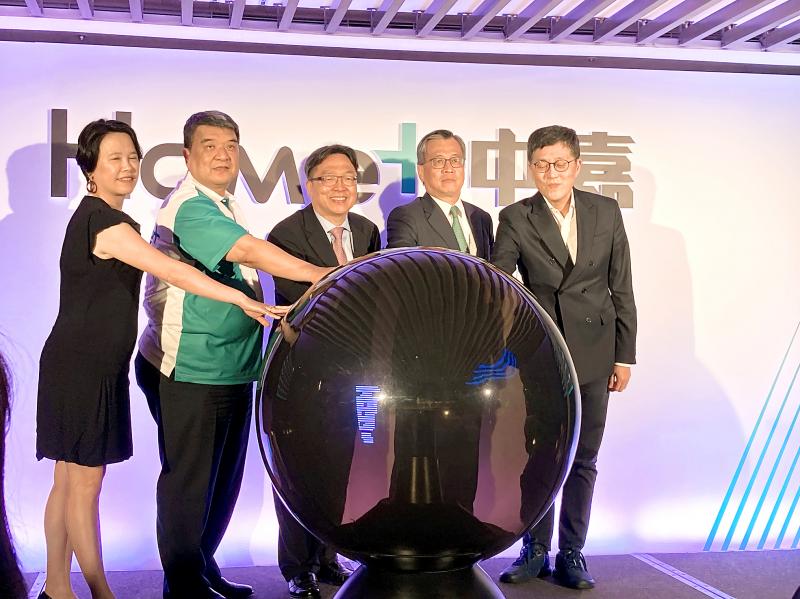China Network Systems (CNS, 中嘉網路) yesterday said it is extending its partnerships with Far EasTone Telecommunications Co (遠傳電信) and Taiwan Star Telecom Co (台灣之星) on high-definition 4K content as part of its efforts to shift to more profitable businesses.
CNS, the nation’s biggest cable TV multiple-systems operator, said it is also in talks with a major telecom to collaborate on video streaming, as over-the-top (OTT) content suppliers have been eroding its base of subscribers.
The number of local cable TV subscribers had dropped to 4.93 million households as of the first quarter of this year, down 2.18 percent from 5.04 million in the same period last year, National Communications Commission data showed.

Photo: Lisa Wang, Taipei Times
“We only operate a platform and do not have our own content. We are open to any type of cooperation that can boost the value and diversity of our hardware, services and products,” CNS chairman Gary Kuo (郭冠群) said.
CNS subscribers would be able to access OTT content from Far EasTone’s friDay and Taiwan Mobile’s CatchPlay.
The company said the convergence of wireless and fixed-line networks would provide a range of services from the Internet of Things and smart home applications.
CNS is shifting its focus to broadband services and has no plans to follow its local peer, Kbro Co (凱擘), in terminating its channel distribution business, he said.
In addition, CNS would help telecoms provide last mile service to households in building 5G networks, as well as enhancing their network coverage in rural areas, Kuo sad.
CNS is the second-biggest shareholder of Taiwan Star. KHL Capital (達勝投資), cofounded by Kuo, and KHL’s investment arm KHL Investment I Ltd (達勝壹甲壹投資) hold a combined 3.4 percent share in Taiwan Star.

In Italy’s storied gold-making hubs, jewelers are reworking their designs to trim gold content as they race to blunt the effect of record prices and appeal to shoppers watching their budgets. Gold prices hit a record high on Thursday, surging near US$5,600 an ounce, more than double a year ago as geopolitical concerns and jitters over trade pushed investors toward the safe-haven asset. The rally is putting undue pressure on small artisans as they face mounting demands from customers, including international brands, to produce cheaper items, from signature pieces to wedding rings, according to interviews with four independent jewelers in Italy’s main

Japanese Prime Minister Sanae Takaichi has talked up the benefits of a weaker yen in a campaign speech, adopting a tone at odds with her finance ministry, which has refused to rule out any options to counter excessive foreign exchange volatility. Takaichi later softened her stance, saying she did not have a preference for the yen’s direction. “People say the weak yen is bad right now, but for export industries, it’s a major opportunity,” Takaichi said on Saturday at a rally for Liberal Democratic Party candidate Daishiro Yamagiwa in Kanagawa Prefecture ahead of a snap election on Sunday. “Whether it’s selling food or

CONCERNS: Tech companies investing in AI businesses that purchase their products have raised questions among investors that they are artificially propping up demand Nvidia Corp chief executive officer Jensen Huang (黃仁勳) on Saturday said that the company would be participating in OpenAI’s latest funding round, describing it as potentially “the largest investment we’ve ever made.” “We will invest a great deal of money,” Huang told reporters while visiting Taipei. “I believe in OpenAI. The work that they do is incredible. They’re one of the most consequential companies of our time.” Huang did not say exactly how much Nvidia might contribute, but described the investment as “huge.” “Let Sam announce how much he’s going to raise — it’s for him to decide,” Huang said, referring to OpenAI

The global server market is expected to grow 12.8 percent annually this year, with artificial intelligence (AI) servers projected to account for 16.5 percent, driven by continued investment in AI infrastructure by major cloud service providers (CSPs), market researcher TrendForce Corp (集邦科技) said yesterday. Global AI server shipments this year are expected to increase 28 percent year-on-year to more than 2.7 million units, driven by sustained demand from CSPs and government sovereign cloud projects, TrendForce analyst Frank Kung (龔明德) told the Taipei Times. Demand for GPU-based AI servers, including Nvidia Corp’s GB and Vera Rubin rack systems, is expected to remain high,